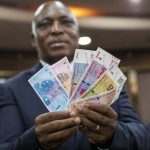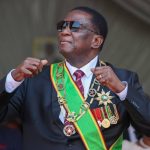 The government is the biggest loser when there is a discrepancy between the official exchange rate and the black market rate, Deputy Finance Minister David Kuda Mnangagwa said yesterday.
The government is the biggest loser when there is a discrepancy between the official exchange rate and the black market rate, Deputy Finance Minister David Kuda Mnangagwa said yesterday.
Responding to questions in Parliament, Mnangagwa said there was a perception that business was the biggest loser but the government, as the biggest spender in the economy, was the biggest loser.
“Whenever there is a gap in the exchange rate, it means that the tax collector is collecting revenues at an official exchange rate and paying for services at a parallel market rate while also paying its workers at the official lower rate while the civil servants have to go out into the market where there is a distortion,” Mnangagwa said.
“This issue of distortion puts pressure, not just on retailers but in general on the economy. This is emanating from what I want to term, a flawed and fractured social contract that was meant to exist between business and government during the subsistence of the structured currency.
“Mr. Speaker Sir, at the formulation of the social contract, the Governor made some postulations that if a retailer, if an importer was to present a bona fide invoice, this invoice would be honoured by the requisite foreign currency because indeed, there are reserves that are commensurate with the amount of ZiG in circulation.”
Mnangagwa said that the system had become flawed because of speculators who wanted to buy hard currency but were not willing to sell it even when they had US dollars.
“Mr. Speaker Sir, the problems we face are a cocktail of three groups of people, I would say. You have retailers who are sticklers for the law and will follow whatever policy is there. You have some who lag behind and then you have a large group who are just greedy,” he said. “Regardless of how good the law as a policy is, they will find ways to arbitrate that and it is easy under the current system that we have, allowing a discount based system will defeat the purpose of our de-dollarisation agenda.”
Zimbabwe recently devalued its local currency, the Zimbabwe Gold (ZiG), from 14:1 to nearly 25:1 after the black market rate had rocketed to as much as 40:1. Yesterday, the ZiG was officialtrading at 26:1 while the blackmarket rate was down to 50:1.
Q & A:
HON. GUMBO: Thank you Mr. Speaker Sir. My question is directed to the Deputy Minister of Finance. The Government policy prohibiting a market-based exchange rate has put a lot of pressure on the retail industry. This has seen quite a number of …
THE HON. SPEAKER: Can you repeat your question please so that it is clearer?
HON. GUMBO: Thank you, Mr. Speaker Sir. I said the Government policy which prohibits the use of a market determined, free market determined exchange rate has put a lot of pressure on the retail industry and this pressure emanates Hon. Speaker Sir, from the discrepancies between the prices that are charged by suppliers to our retailers and the prices that our retailers are mandated to sell to the public. In light of that, a lot of shops shelves are going empty. A lot of key and essential products are now being found on the black market and the effect is very heavy on the consumers. Why or what is Government policy in allowing retailers to price their goods in US dollars at a discounted rate, as opposed to them being bound to utilise the interbank rate, the prevailing rate of the day as imposed by Government in their pricing system? What is Government’s policy in terms of addressing those discrepancies and ensuring that the pricing structure and pricing system within our shops allows for goods to remain in the retail shops as opposed to the black market when the prices become exorbitant in US dollars?
Continued next page
(301 VIEWS)

